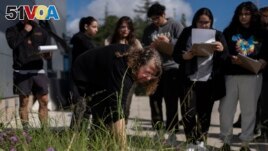25 May 2024
Across the United States, students are now looking to community colleges for training in jobs related to climate change solutions. These include wind and solar energy, electrification, and protecting water and farmland.
For example, on the south side of Chicago, Illinois, students learn how to work on an electric vehicle (or EV) in a new technician program at Olive-Harvey College.
About 240 kilometers south, students at Danville Area Community College learn how to fix large wind turbines.

Associate professor Vered Mirmovitch, front, leads students on a plant tour on the West Los Angeles College campus, March 12, 2024. As students consider jobs that play a role in solving the climate crisis, community colleges are responding. (AP Photo/Jae C. Hong
In Albuquerque, students learn how to work on solar panels at Central New Mexico Community College.
In Boston, Massachusetts, students at Roxbury Community College's Center for Smart Building Technology learn how to strengthen buildings against extreme temperatures. They also learn how to build structures that contribute less to climate change.
Kyle Johnson is a 34-year-old student at Olive-Harvey College in Illinois. Johnson has long enjoyed working on gasoline-fueled cars. But automobiles are increasingly electric.
"When it came to EVs, I knew that the times are changing, and I didn't want to get left behind," he said. "Climate change has a lot to do with my decision," he added.
Changing job market
The job market already has been changing. Businesses and jobs that address climate change are growing. And now legislation like the 2022 Inflation Reduction Act is adding more investment which will most likely mean more jobs.
Millions of clean energy workers are needed to meet targets set by governments and companies to reduce their greenhouse gas emissions. Many of these job opportunities are growing faster than overall employment in the U.S.
Brian Lovell of Roxbury Community College has seen that firsthand. "While the students are still in the program, they get employed because the demands of industry are so acute," he said of the students in Roxbury, Massachusetts.
Traditionally, people going into these industries gained skills through local employers and labor organizations. But now community colleges can help. They listen to companies and state officials and create hands-on training for open jobs.
Kate Kinder is executive director of the National Council for Workforce Education. She said "over half of these jobs" require less than a four-year college degree and more than a high school education.
"That's prime community college space," she said of the two-year associate program.
These job openings draw in students like Tannar Pouilliard.
Pouilliard had thought he would become an automotive technician. However, after learning about openings in the wind power industry, he enrolled in Danville's wind energy technician classes. He said, "It really opens the door for people out here for jobs."
College investment in new programs
At the same time, community colleges have been losing students, not unlike the rest of higher education. Currently, more people are entering the workforce straight out of high school. And some community colleges have not recovered from the decrease in enrollment that happened during the pandemic.
Some schools say investing in these programs is a balancing act between staying up-to-date and risking a bet on developing technology.
"We feel the pressure," said Monica Brummer. She is director of the Pacific Northwest Center of Excellence for Clean Energy at Centralia College in Washington. "If we create curriculum today for, say, a hydrogen technician, it may not be the curriculum we need in two or three years, because the technology is changing so fast ..."
Some schools hope to make the change without new and costly investments.
For example, Minnesota's Inver Hills Community College launched a climate change program in 2022 using existing areas of study at the school. Now, administrators are considering expanding that program. As well, Cape Cod Community College recently changed from specialized workforce training to a wider sustainable energy study program.
Other community colleges help prepare students like Sarah Solis for a four-year degree program related to climate change.
Solis was enrolled at West Los Angeles College, a community college near the Inglewood Oil Field. The oil field is what led her to environmental studies. She later changed to the school's climate change degree, which was new at the time. Its climate change program has grown since then; it is now home to the California Center for Climate Change Education.
Then Solis went to the University of California, Davis, and earned a degree in environmental science and management. She teaches city farms how to deal with a warming future. And she credits her success to her community college experience.
Solis called her experience at the community college "life changing." She added, "I would not be an environmental scientist right now if I hadn't gone to West."
Many other students said the same thing.
I'm Dan Friedell. And I'm Anna Matteo.
Alexa St. John in Detroit and Melina Walling reported this story for the Associated Press. Anna Matteo adapted it for VOA Learning English.
_____________________________________
Words in This Story
wind turbine -n. an engine whose central driving shaft is fitted with a series of blades spun around by the pressure wind for generating electricity
solar panel -n. a battery of solar cells (as on a rooftop)
greenhouse gas -n. any of various gaseous compounds (such as carbon dioxide or methane) that absorb infrared radiation, trap heat in the atmosphere, and contribute to the greenhouse effect
acute -adj. demanding urgent attention
prime -adj. first in rank or importance
associate -adj. a degree given especially by a junior college
enroll -v. to become a member